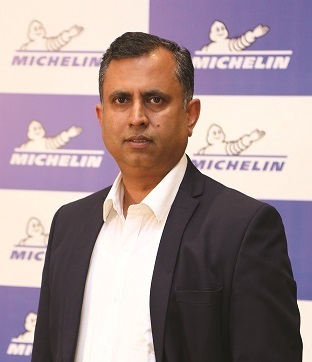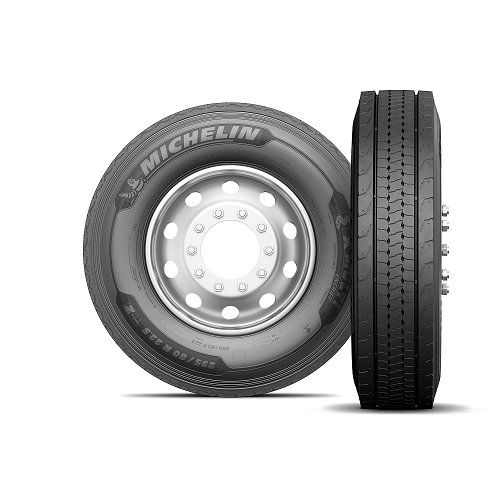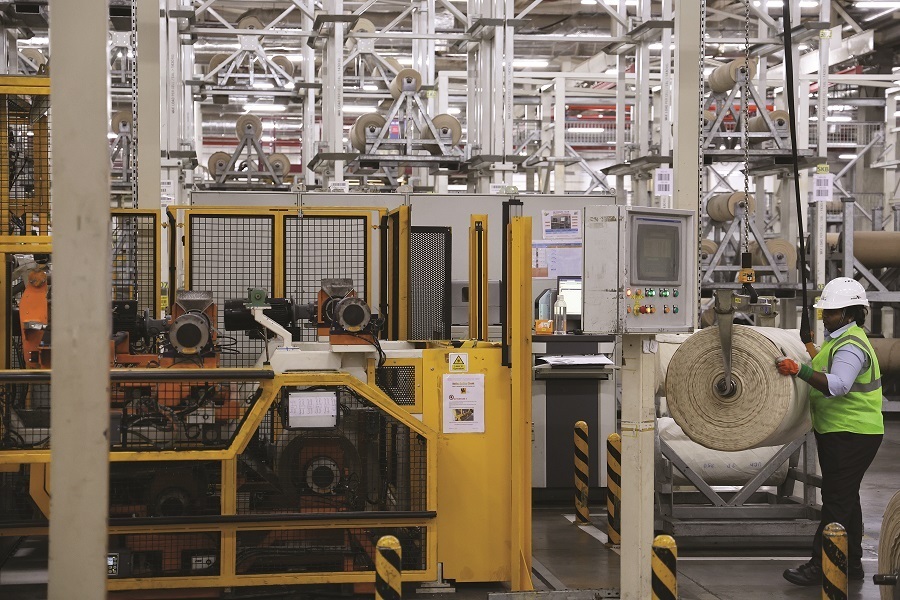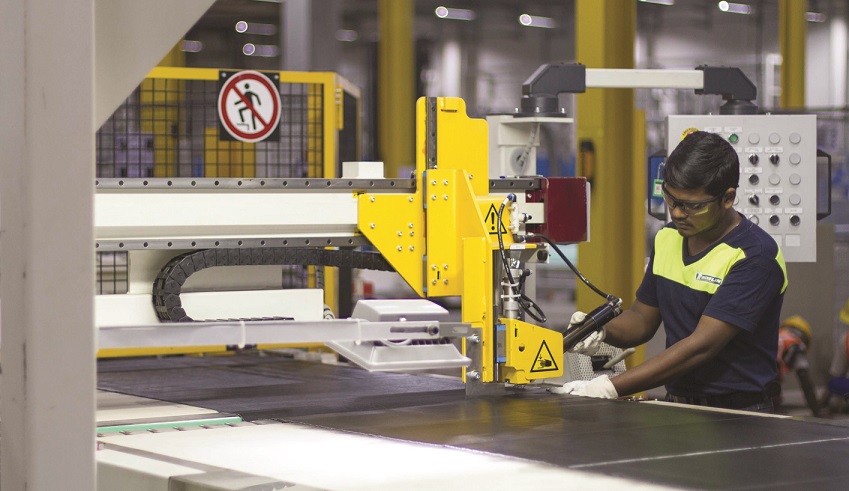Michelin India Continues To Bet High On Premium Segment
- By Sharad Matade
- February 21, 2025
Michelin India is doubling down on the country’s fast-growing premium tyre segment, a niche yet rapidly expanding market. The company, which has been manufacturing radial commercial tyres at its Chennai plant, is now investing over INR 5.64 billion in a brownfield expansion to produce passenger car radial tyres at the same facility.
Today, Michelin India is not just a manufacturing hub but also a critical part of the global Michelin ecosystem, housing the company’s world AI headquarters and a state-of-the-art R&D centre, growing from a modest operation with fewer than 100 employees to a total workforce of nearly 3,000.
In an exclusive interview with Tyre Trends, Shantanu Deshpande, Managing Director, Michelin India, touches upon the company’s strategic priorities, the evolving tyre industry and its ambitious plans for the premium and electric vehicle (EV) segments.
He also sheds light on Michelin’s sustainability initiatives and how the company is leveraging India’s growing infrastructure and consumer preferences to solidify its position as a market leader in the premium segment. The premium proposition:
Catering to discerning consumers
When Michelin first entered the Indian market, it was a niche player with a limited presence. The company’s initial focus was on introducing radial tyres to a market dominated by bias tyres. Over the years, Michelin has not only expanded its manufacturing footprint but also cemented its position as a leader in the premium tyre commercial tyre segment.
 “We started with TBR tyres (Truck and Bus Radial) over a decade ago,” Deshpande recalls. “Back then, the industry was dominated by bias tyres. Today, radial tyres account for almost 70 to 80 percent of the market, and we’re now seeing a shift from tube-type to tubeless tyres. This transformation has been driven by infrastructure improvements and the rise of e-commerce, which demands faster, more efficient logistics.”
“We started with TBR tyres (Truck and Bus Radial) over a decade ago,” Deshpande recalls. “Back then, the industry was dominated by bias tyres. Today, radial tyres account for almost 70 to 80 percent of the market, and we’re now seeing a shift from tube-type to tubeless tyres. This transformation has been driven by infrastructure improvements and the rise of e-commerce, which demands faster, more efficient logistics.”
Currently, tubeless tyres have a 5-10 percent market share, while tube tyres own the rest.
Deshpande highlights the dramatic changes in India’s road infrastructure as a key driver of this evolution. “When I was a sales executive, the Delhi-Mumbai corridor took eight days to traverse. By the end of this year, it will take just 24 hours. Truck speeds have increased from 25-30 km/h to 40-50 km/h, and soon, they’ll reach 60 km/h, comparable to Europe. These changes have created a demand for high-performance tyres that can handle heavy loads and long distances,” he explains.
The rise of e-commerce has further accelerated this demand. “Some fleets are running 25,000 kilometres per month,” Deshpande notes. “This is a significant distance for trucks, and it underscores the need for tyres that offer durability, fuel efficiency and safety.”
Michelin’s focus on premium tyres has been a cornerstone of its strategy in India. Deshpande emphasises that the company’s value proposition lies in offering a lower total cost of ownership (TCO) for fleet operators, particularly in the TBR segment.
“Fuel accounts for 60 percent of a truck operator’s costs,” he explains. “Michelin intends to work with like-minded fleet operators who understand the value proposition of TCO. We are changing their tube radial tyres to tubeless radial tyres. For instance, our X Multi Energy Z+ tyre, with the lowest rolling resistance in the country, can save up to 15 percent on fuel compared to traditional tubeless radial tyres. This is a game-changer for fleet operators who understand the importance of TCO.”
Cost per kilometre Vs total cost of ownership
Deshpande elaborates on Michelin’s approach to cost per kilometre (CPK) and total cost of ownership (TCO), which are critical metrics for fleet operators.

“Cost per kilometre is one way to simplify invoicing, but it’s not the complete picture,” he explains. “While CPK focuses on the life of the tyre, we believe in a broader approach – total cost of ownership. A Michelin tyre not only lasts longer but also saves fuel, which is a significant cost for fleet operators. It’s important to look at the overall savings, not just the tyre’s lifespan.”
Michelin offers innovative service models to fleet operators, including on-site maintenance and diagnostics. “We have models where technicians are stationed at fleet yards,” Deshpande says. “We provide free diagnostics to identify issues like under-inflated or misaligned tyres, which can significantly impact costs. We then offer maintenance services to ensure optimal performance, and this is a paid service – it’s not free. We work with fleets to show them the cost savings we can bring per-truck, per-month basis.”
The company also invests in equipment like tyre fitting and alignment machines at fleet yards. “We bear these costs into our service offerings,” Deshpande adds.
Premium passenger radial tyres: New target
In the passenger vehicle segment, Michelin is targeting the growing demand for premium and luxury cars.
In September 2024, Michelin India entered the passenger car radial tyre market with the launch of an INR 5.64-billion brownfield project in Thervoy kandigai, near Chennai. “This investment is over and above the existing investment of INR 28.40 billion for the company in our factory,” adds Deshpande

“We believe there is significant potential in the passenger segment for several reasons. Over the last three years, the vehicle landscape in India has significantly changed,” Deshpande says. “Today, most new SUVs and cars are being launched with bigger tyre sizes, such as 16-inch or 17-inch. This shift aligns perfectly with our focus on premium tyres.”
According to Deshpande, the shift towards premium products extends beyond automobiles. “There is a growing demand for premium products across all walks of life, not just automobiles. This includes two-wheelers, luxury bags and other high-end items. Consumers are willing to pay for quality,” adds Deshpande.
Deshpande points to the changing profile of Indian consumers as a key factor driving this trend. “The Indian consumer is evolving,” he says. “Ten years ago, a Mercedes owner was typically an industrialist or a Bollywood star. Today, young professionals in their 30s are driving BMWs and Mercedes. Last year, close to 50,000 cars priced above INR 50 lakh were sold in India, and we expect this number to double soon.”
Improved road infrastructure has revolutionised leisure travel habits. “10 to 15 years ago, travelling from Mumbai to Delhi by car was uncommon. It’s possible to drive from Mumbai to Nagpur in eight hours today,” Deshpande said. “People now prefer driving long distances rather than flying, which has significantly changed how consumers view their cars.”
Michelin’s Chennai plant is strategically focused on producing tyres for this premium segment. “We will soon begin manufacturing car tyres in India. The size range will be 16” and above,” Deshpande says. “Our goal is to cater to the top 25-30 percent of consumers who value quality and are willing to pay for it.”
The company’s retail distribution strategy is equally focused on maintaining a premium experience. “A Michelin customer, such as a BMW owner, expects nothing less than a premium experience,” Deshpande explains. “We’re not aiming for a vast network of dealers. Instead, we’re focusing on well-branded shops that offer a superior consumer experience.”
The company plans to open its premium retail shops for passenger car tyres in the top 15 to 20 cities to cater to the replacement market.
The EV opportunity: Balancing performance and sustainability
As the automotive industry shifts towards electrification, Michelin is positioning itself as a leader in EV tyres, and Deshpande also acknowledges the unique challenges and opportunities this transition presents.
“EV tyres require specific designs, such as low rolling resistance and larger diameters,” he explains. “But it’s not just about range. Load-carrying capacity, noise reduction and durability are equally important. Michelin has mastered the art of balancing these performance criteria.”
Deshpande dispels the misconception that EV tyres are fundamentally different from those used in internal combustion engine (ICE) vehicles. “Some of our tyres are excellent for ICE vehicles but even better for EVs,” he says. “We don’t design tyres purely for range. Instead, we ensure they deliver the right balance of performance, safety and comfort.”
Michelin’s approach to EV tyres is already yielding results. “The tyres we’ve designed for ICE vehicles are being adopted by EV manufacturers globally,” Deshpande reveals. “In India, as the EV market grows, we’ll leverage our global expertise to cater to this segment.”
Sustainability at the core
Sustainability is a key pillar of Michelin’s strategy, both globally and in India. The company’s Chennai plant is a zero-discharge facility that recycles all its water through rainwater harvesting. By the end of this year, the plant will be powered entirely by renewable energy.
Deshpande asserts,” Our Chennai plant is one of the most high-tech and green facilities in the Michelin world. It’s a benchmark for safety, modernity and environmental responsibility.”
The tyres manufactured in Chennai are exported to North America, Europe, Africa and the Middle East.
Michelin’s commitment to sustainability extends beyond its manufacturing processes. The company also focuses on developing tyres that increase fuel efficiency and reduce emissions. “Our X Multi Energy tyre, for instance, has a rolling resistance of just 4.5 kg per tonne, compared to the industry average of 6.5-7 kg per tonne,” Deshpande says. “This translates to significant fuel savings and a lower carbon footprint.”
Premium two-wheeler segment: Another growing opportunity
Michelin India continues its presence in the two-wheeler tyre segment through a manufacturing arrangement with STL (Spinmax tyres Pvt Ltd) via an offtake arrangement.

Despite current import restrictions, the company eyes opportunities in India’s evolving motorcycle market.
“The two-wheeler segment is undergoing significant transformation,” says the Managing Director of Michelin India. “With the increasing launch of high-powered bikes like Royal Enfield and other global brands, along with Indian manufacturers producing world-class bikes for export, this segment presents a great opportunity.”
The company sees a natural overlap between its target markets. “The profile of consumers buying high-powered bikes often overlaps with those buying premium cars,” Deshpande thinks. Michelin plans to focus on motorcycles and scooters of 250 cc and above, where the company believes its brand visibility and value proposition are strongest.
The strategy mirrors Michelin’s approach in the passenger vehicle segment. The company maintains local outsourced manufacturing of two-wheeler tyres while exploring future expansion opportunities.
The French tyre maker continues to evaluate opportunities in India’s growing premium two-wheeler market as domestic manufacturers increasingly target global markets with higher-end models.
Michelin India: A place for global R&D & AI Centre
In addition to Michelin India’s manufacturing capabilities, it has also established a Global Hub in Pune focusing on next-generation technologies such as AI, data engineering, digital services and R&D centre, which supports research efforts for the Michelin Group worldwide.
Deshpande is also optimistic about the role of Indian R&D in Michelin’s global operations. “Our Pune centre is not just supporting India; it’s contributing to global markets,” he says. “The talent here is recognised for its innovation and expertise, not just cost arbitrage. At our Global Competency Center in the city, the company isn’t just optimising tyres but redefining how they’re designed, manufactured and used. This is a proud moment for us.”
As Deshpande puts it, “Michelin is not just selling tyres; we’re selling safety, comfort and peace of mind. In a market as dynamic as India, that’s a value proposition that resonates.”
Sangwoo Ryu Named CEO Of Kraton Corporation
- By TT News
- February 07, 2026

Kraton Corporation, a leading global producer of speciality polymers and high-value bio-based chemicals derived from pine wood pulping co-products, has named Sangwoo Ryu as its new Chief Executive Officer. Ryu possesses over 25 years of leadership in finance and operations within international markets. He is currently the CEO of Cariflex Pte Ltd, a former Kraton spin-off now under DL Chemical, where he initially served as Chief Financial Officer starting in February 2020. He assumed the Cariflex CEO role in April 2025 following the promotion of its former CEO, Prakash Kolluri, to President of Kraton's Polymer business.
Ryu’s deep expertise in financial strategy, investment controls and operational planning is expected to strengthen Kraton’s standing as a reliable leader in global Pine Chemical and Polymers markets. In his new position, he will collaborate with Kraton’s Executive Leadership, Board of Directors and Cariflex Leadership to guide strategic decisions and operational excellence, reinforcing the company’s commitment to sustained growth and organisational stability.
Ryu said, “I want to express my gratitude towards the members of the Board of Directors and the Kraton Leadership Team for their unwavering dedication to Kraton’s success. I’m looking forward to leading Kraton into the next era of excellence, building upon the strong foundations and principles set forth in our vision and values.”
Industry Veteran Dieter Jerschl To Represent FORNNAX In Central Europe
- By TT News
- February 07, 2026

As part of its strategic growth into Central Europe, FORNNAX TECHNOLOGY, a global leader in recycling equipment manufacturing, has established a new sales partnership in Germany. The company has appointed industry veteran Dieter Jerschl as its representative for the region to drive the promotion and implementation of its recycling systems. Jerschl’s extensive expertise, built over two decades with prominent firms like BHS, Eldan and Vecoplan, encompasses a deep understanding of diverse waste streams such as tyre, cable, municipal solid waste and e-waste.
This collaboration, initially targeting Germany, Austria and adjacent countries, is designed to be flexible and scalable. Its primary aim is to cultivate a strong project pipeline and solidify FORNNAX’s regional footprint. The partnership extends beyond sales to include comprehensive technical support, with Jerschl’s team providing vital value-added services like installation, maintenance and spare parts assistance. This local service framework is intended to ensure efficient project execution, minimise operational downtime and elevate customer satisfaction.
By leveraging Jerschl’s profound market insight and established networks, FORNNAX seeks to accelerate the adoption of its high-performance shredding and pre-processing technologies. The move underscores the company’s global strategy of embedding local expertise within key markets, which it deems crucial for developing technically sound solutions tailored to specific regional waste challenges. This initiative reinforces FORNNAX’s dedication to innovation and environmental stewardship, advancing its mission to deliver sustainable recycling solutions worldwide.
Jerschl said, “I’ve known FORNNAX for over a decade and have followed their growth closely. What attracted me to this collaboration is their state-of-the-art technology; it is powerful, sustainable, and economically viable. There is great potential to introduce FORNNAX’s innovative systems to more markets across Europe, and I am excited to be part of that journey. We are committed to increasing market awareness and establishing new reference projects across the region. My goal is not only to generate business but to lay the foundation for long-term growth. Ideally, we aim to establish a dedicated FORNNAX legal entity or operational site in Germany over the next five to 10 years.”
Jignesh Kundaria, Director and CEO, FORNNAX, said, “We see tremendous potential in the Central European market. Partnering with someone as experienced and well established as Jerschl gives us a strong foothold and allows us to better serve our customers. This marks a major milestone in our efforts to promote reliable, efficient and future-ready recycling solutions globally.”
- KraussMaffei Extrusion
- Fernley H. Banbury Award
- Rubber Division of the American Chemical Society
- Sustainable Rubber Processing
- Global Polymer Summit
KraussMaffei’s Dr Gerard Nijman Earns Prestigious Fernley H. Banbury Award For 2026
- By TT News
- February 06, 2026

Dr Gerard Nijman of KraussMaffei Extrusion has been selected as the 2026 recipient of the prestigious Fernley H. Banbury Award, one of the rubber industry’s highest international honours, presented by the Rubber Division of the American Chemical Society (ACS). This award annually recognises outstanding scientific and technological contributions to the field.
The award commemorates the inventor of the internal mixer and highlights sustainable innovations in production technology, instrumentation, process control and the development of processing methods for rubber and similar materials. Dr Nijman’s career exemplifies such innovation, having significantly advanced rubber rheology, pioneered new mixing and multiplex extrusion technologies and modernised the production of silica compounds for the tyre industry.
His work has effectively bridged the gap between scientific research and industrial application. Notably, in the 1990s at Vredestein, he introduced novel mixing technologies and multiplex extrusion to tyre manufacturing. He also contributed to pioneering processes for silica compound processing, foundational to technologies like Michelin’s ‘Green Tyre’. Furthermore, his rheology-based designs for extruder screws and flow channels have helped shape enduring industrial standards.
Dr Nijman, who joined KraussMaffei Extrusion in 2017, brings decades of expertise from previous roles at Apollo Tyres Ltd and Vredestein Banden BV. His ongoing collaborations with the German Institute for Rubber Technology (DIK) and the University of Twente have also profoundly influenced his approach. KraussMaffei Extrusion itself is globally recognised for its tyre technology, building on longstanding Berstorff expertise to deliver advanced extrusion solutions for treads, sidewalls, innerliners and other components, as well as high-performance multiplex and calender systems.
The award acknowledges not only his specific technical achievements but also his distinguished career and lasting impact on rubber processing. The official presentation will be held in September 2026 during the Global Polymer Summit in Louisville, Kentucky, US.
Dr Nijman said, “It is a great honour for me to receive the Fernley H. Banbury Award. This recognition confirms the importance of the close connection between research and industrial practice in rubber processing and motivates me to continue to drive forward innovative solutions for our industry.”
Ralf Benack, Managing Director, KraussMaffei Extrusion, said, "We warmly congratulate Dr Nijman on this outstanding award. With his in-depth knowledge, many years of experience and tireless dedication, he has had a decisive influence on the rubber and tyre industry and has further developed our technologies in a targeted manner. This recognition is more than deserved. We are very proud to have Dr Nijman in our team!"
Michelin Appoints James Dimmock As Commercial Communications Manager For UK And Ireland
- By TT News
- February 05, 2026

Michelin has appointed James Dimmock as its new Commercial Communications Manager for the United Kingdom and the Republic of Ireland. Based at the company's Stoke-on-Trent headquarters, he will report to the Northern European Communications team. In this capacity, Dimmock will oversee all commercial communications, including public relations, social media and influencer partnerships.
His mandate involves crafting the brand's commercial narrative, fostering stronger connections with media and content creators and producing innovative digital content to support the brand's growth. He brings more than two decades of extensive experience with Michelin to the role, having held various senior marketing and communications positions both internationally and domestically. His most recent role was as Social Media and Influencer Manager. He will now lead these efforts locally while integrating with the broader communications team.
John Howe, Managing Director, Michelin UK, said, “James has already made a significant contribution to Michelin communications activity in the UK & ROI. His deep understanding of our business and products, combined with his strategic and creative approach, makes him ideally placed to lead our commercial communications as we continue to evolve our brand.”
Dimmock said, “I am excited to be taking on this new role at Michelin. It is a privilege to continue building on the work we have already achieved and to help drive the next phase of our commercial communications strategy across the UK & ROI.”







Comments (0)
ADD COMMENT